Herbert Ross, DC with Keri Brenner, L.Ac.
See book keywords and concepts |
 However, there are specific remedies that can be helpful for insomnia, often because they address anxiety: Aspen, Black-Eyed Susan, Chamomile, Chaparral, Dill, Lavender, Mugwort, Red Chestnut, St. john's wort, and White Chestnut.47 Flower essences can be useful for insomnia in the following ways:
• They can help to ground and embody, bringing mental and spiritual components in alignment with a physical relaxation response.
• They can open and clarify, to awaken consciousness. Sometimes when we awaken the consciousness, that allows the physical part of the body to go to sleep. However, there are specific remedies that can be helpful for insomnia, often because they address anxiety: Aspen, Black-Eyed Susan, Chamomile, Chaparral, Dill, Lavender, Mugwort, Red Chestnut, St. john's wort, and White Chestnut.47 Flower essences can be useful for insomnia in the following ways:
• They can help to ground and embody, bringing mental and spiritual components in alignment with a physical relaxation response.
• They can open and clarify, to awaken consciousness. Sometimes when we awaken the consciousness, that allows the physical part of the body to go to sleep. |
| When Jerry described his doses, the doctor said that he was actually taking toxic levels of the sedative herbs valerian and St. john's wort, L-tryptophan, and other substances. Not surprisingly, given his history of poor sleep and overuse of supplements, Jerry had problems with his digestion, including frequent indigestion after meals, gas and bloating, and a queasy stomach.
The chiropractor evaluated Jerry's spinal function through an exam and other tests, and found that he had inflammation and joint dysfunction in his middle and upper spine. |
| If you're taking pharmaceutical drugs, it's best to consult with your doctor before taking St. john's wort. success story
Homeopathy Cures Insomnia
DOLORES, A 38-YEAR-OLD HOSPITAL DESK CLERK, had tried almost : all the traditional and alternative cures for her insomnia, which had been plaguing her for the past five years. She would either fall asleep easily and then wake up at 3 a.m. or 4 a.m., unable to fall back asleep, or if she had trouble falling asleep, she would be up until 3 a.m. Sometimes, she would fall asleep easily but wake up every hour starting around 1 a.m. |
Heather Boon, BScPhm, PhD and Michael Smith, BPharm, MRPharmS, ND
See book keywords and concepts |
 St. john's wort appears to induce cytochrome P450 enzymes, specifically CYP1A2,117 CYP3A2120 and CYP3A4,121122 thus enhancing the metabolism of these (and potentially other) medications. St. john's wort has also been reported to reduce the expression of serotonin receptors.29 A 2-week washout period is recommended between usage of St. john's wort and a selective serotonin reuptake inhibito (SSRI) such as paroxetine or fluoxetine.98,15 In addition, it probably activates P-glycoprotein, which can further increase the elimination of many drugs. St. john's wort appears to induce cytochrome P450 enzymes, specifically CYP1A2,117 CYP3A2120 and CYP3A4,121122 thus enhancing the metabolism of these (and potentially other) medications. St. john's wort has also been reported to reduce the expression of serotonin receptors.29 A 2-week washout period is recommended between usage of St. john's wort and a selective serotonin reuptake inhibito (SSRI) such as paroxetine or fluoxetine.98,15 In addition, it probably activates P-glycoprotein, which can further increase the elimination of many drugs. |
Jack Challem
See book keywords and concepts |
 Occasionally, taking these drugs will lead to an increase in suicidal thoughts and behavior.
St. john's wort is widely used to treat depression in Europe, where herbs have been used medicinally for at least two thousand years, but the U.S. pharmaceutical industry has convinced most American physicians that its higher-priced drugs are superior. The herb can also help to alleviate symptoms of premenstrual syndrome, including anxiety, depression, nervous tension, confusion, and crying.
Dosage: The chemical constituents of St. Occasionally, taking these drugs will lead to an increase in suicidal thoughts and behavior.
St. john's wort is widely used to treat depression in Europe, where herbs have been used medicinally for at least two thousand years, but the U.S. pharmaceutical industry has convinced most American physicians that its higher-priced drugs are superior. The herb can also help to alleviate symptoms of premenstrual syndrome, including anxiety, depression, nervous tension, confusion, and crying.
Dosage: The chemical constituents of St. |
Marshall Editions
See book keywords and concepts |
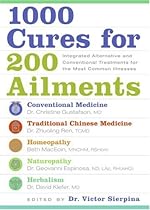 You can also mix St. john's wort oil with garlic oil, to relieve ear pain and reduce infection. Place two warm drops of oil in the affected ear two times a day then gently place a cotton wool ball in the ear. Do not use this treatment if the ear is perforated.
258
HOMEOPATHY
0
Due to its chronic nature, homeopathic treatment for this condition needs to be placed in the hands of a trained homeopathic practitioner. This is a worthwhile step to take before considering inserting grommets. You can also mix St. john's wort oil with garlic oil, to relieve ear pain and reduce infection. Place two warm drops of oil in the affected ear two times a day then gently place a cotton wool ball in the ear. Do not use this treatment if the ear is perforated.
258
HOMEOPATHY
0
Due to its chronic nature, homeopathic treatment for this condition needs to be placed in the hands of a trained homeopathic practitioner. This is a worthwhile step to take before considering inserting grommets. |
Gary Null and Amy McDonald
See book keywords and concepts |
 Results showed significant improvements in symptoms of depression and memory performance.
St. john's wort for Depression—An Overview and Meta-analysis of Randomized Clinical Trials. Linde K; et al. British Medical Journal, 1996 August 3, 313(7052):253-258.
Results of this meta-analysis involving 2 3 randomized studies, 15 of which were placebo-controlled, found that hypericum extracts proved significantly effective in the treatment of patients suffering from moderate to mildly severe depression.
Cimicifuga for Depression. Frances D. Medical Herbalism, 1995 Spring/Summer, 7(l-2):l-2. Results showed significant improvements in symptoms of depression and memory performance.
St. john's wort for Depression—An Overview and Meta-analysis of Randomized Clinical Trials. Linde K; et al. British Medical Journal, 1996 August 3, 313(7052):253-258.
Results of this meta-analysis involving 2 3 randomized studies, 15 of which were placebo-controlled, found that hypericum extracts proved significantly effective in the treatment of patients suffering from moderate to mildly severe depression.
Cimicifuga for Depression. Frances D. Medical Herbalism, 1995 Spring/Summer, 7(l-2):l-2. |
by Michael Murray, N.D. and Joseph Pizzorno, N.D.
See book keywords and concepts |
| People taking prescription drugs need to check with their doctor or pharmacist before taking Saint john's wort extract, as it appears to induce enzymes in the liver and gut that detoxify certain drugs. Drugs that are metabolized by these enzymes include cyclosporine; digoxin; indinavir; oral contraceptives; theophylline; tricyclic antidepressants, such as amitriptyline; and anticoagulants, such as warfarin (Coumadin). Do not use Saint john's wort if you are taking any of these drugs without consulting a physician first. |
Marshall Editions
See book keywords and concepts |
 Herbs: St. john's wort has been shown to be useful for vitiligo as it has properties that make the skin more sensitive to light. Take 2-4 g a day or 1 tsp twice a day. Sarsaparilla is a skin tonic with many healing properties. Take 500 mg in capsule form or 4 ml of tincture three times a day. Taking burdock root, at 300 mg in capsule form three times a day or 8 ml amounts of tincture per day, can also be helpful. Herbs: St. john's wort has been shown to be useful for vitiligo as it has properties that make the skin more sensitive to light. Take 2-4 g a day or 1 tsp twice a day. Sarsaparilla is a skin tonic with many healing properties. Take 500 mg in capsule form or 4 ml of tincture three times a day. Taking burdock root, at 300 mg in capsule form three times a day or 8 ml amounts of tincture per day, can also be helpful. |
by Michael Murray, N.D. and Joseph Pizzorno, N.D.
See book keywords and concepts |
| Do not use Saint john's wort if you are taking a prescription antidepressant or antianxiety drug without consulting a physician first.
Diabetes Mellitus
Diabetes mellitus is a chronic disorder of carbohydrate, fat, and protein metabolism characterized by fasting elevations of blood sugar (glucose) levels and a greatly increased risk of heart disease, stroke, kidney disease, retinopathy, and loss of nerve function. Diabetes can occur when the pancreas does not secrete enough insulin or when the cells of the body become resistant to insulin. |
Nicola Reavley
See book keywords and concepts |
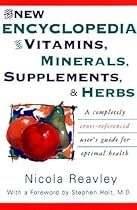 Cautions
Senna should not be used for more than 10 days at a time and should not be used at all during pregnancy; lactation; or by those who have intestinal obstructions, inflammatory bowel disease or abdominal pain due to unknown causes.
St john's wort (Hypericum perforatum)
St john's wort has a long history of use and has several actions including antidepressant, antiviral and antibacterial effects.
Uses
St john's wort is becoming increasingly popular as a treatment for mild to moderate depression, including menopausal depression. It can also be used to treat viral infections. Cautions
Senna should not be used for more than 10 days at a time and should not be used at all during pregnancy; lactation; or by those who have intestinal obstructions, inflammatory bowel disease or abdominal pain due to unknown causes.
St john's wort (Hypericum perforatum)
St john's wort has a long history of use and has several actions including antidepressant, antiviral and antibacterial effects.
Uses
St john's wort is becoming increasingly popular as a treatment for mild to moderate depression, including menopausal depression. It can also be used to treat viral infections. |
Thomson Healthcare, Inc.
See book keywords and concepts |
 TRANYLCYPROMINE SULFATE
5-HTP
(Concurrent use may result in an increased risk of serotonin syndrome (hypertension, hyperthermia, myoclonus, mental status change))
TRAZODONE HYDROCHLORIDE
St. TRANYLCYPROMINE SULFATE
5-HTP
(Concurrent use may result in an increased risk of serotonin syndrome (hypertension, hyperthermia, myoclonus, mental status change))
TRAZODONE HYDROCHLORIDE
St. |
| Red Clover
(Increased risk of bleeding)
LYCOPUS VIRGINICUS
(See under Bugleweed)
MAO INHIBITORS
Brewer's Yeast
(Increase in blood pressure) Ginkgo
(May potentiate MAOI effects) Ginseng
(Combination increases chance for headache, tremors, mania) Kava Kava
(May increase toxicity associated with excessive inhibition of
MAOI) Licorice
(Increased risk of toxicity associated with inhibition of
MAOIs) Ma-Huang
(Increases sympathomimetic effects of ephedrine) Scotch Broom
(Increased risk of hypertensive crisis)
St. |
Bryan Hanson, PhD
See book keywords and concepts |
 John's wort when I see it?
• What time of year should I collect the plant?
• What part of the plant should I collect?
• How much of the plant should I take, and how should I take it?
• What are the active ingredients in the plant?
• How do the active ingredients work?
• Can I overdose or poison myself by taking too much?
• Can the plant be dangerous if I'm pregnant or have high blood pressure? John's wort when I see it?
• What time of year should I collect the plant?
• What part of the plant should I collect?
• How much of the plant should I take, and how should I take it?
• What are the active ingredients in the plant?
• How do the active ingredients work?
• Can I overdose or poison myself by taking too much?
• Can the plant be dangerous if I'm pregnant or have high blood pressure? |
Phyllis A. Balch, CNC
See book keywords and concepts |
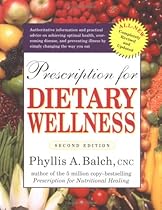 Good: burdock, dandelion, ginseng, ginkgo biloba, licorice, parsley, milk thistle, olive leaf, red clover, St. john's wort (herbal extracts). Also, bee propolis, coenzyme 1 (ENADA), omega-3 oil, primrose oil.
Best: all leafy greens, broccoli, dandelion green.
Good: beet green, cabbage, carrot, green pepper, kale, onion, kelp, spinach, watercress, wheatgrass.
Depression
Apple, banana, blueberry, cranberry, lemon, papaya, peach, pineapple.
Best: alfalfa, flaxseed oil, garlic, St. john's wort (herbal extracts). Also, S-adenosylmethionine (SAMe), spirulina. Good: burdock, dandelion, ginseng, ginkgo biloba, licorice, parsley, milk thistle, olive leaf, red clover, St. john's wort (herbal extracts). Also, bee propolis, coenzyme 1 (ENADA), omega-3 oil, primrose oil.
Best: all leafy greens, broccoli, dandelion green.
Good: beet green, cabbage, carrot, green pepper, kale, onion, kelp, spinach, watercress, wheatgrass.
Depression
Apple, banana, blueberry, cranberry, lemon, papaya, peach, pineapple.
Best: alfalfa, flaxseed oil, garlic, St. john's wort (herbal extracts). Also, S-adenosylmethionine (SAMe), spirulina. |
by Michael Murray, N.D. and Joseph Pizzorno, N.D.
See book keywords and concepts |
| However, while Saint john's wort extract appears to be as effective as or possibly even more effective than conventional antidepressant drugs in mild to moderate depression, it does not appear to be as effective as conventional drugs in severe depression.
No significant side effects have been reported in the numerous double-blind studies. In a large-scale safety study involving 3,250 patients conducted in Germany, undesired side effects were reported in 79 patients (2.43 percent). The most frequently noted side effects were gastrointestinal irritation (0.55 percent), allergic reactions (0. |
James A. Duke, Ph.D.
See book keywords and concepts |
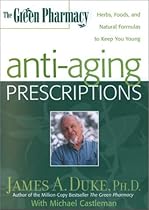 Fortunately, you can prevent oxidative damage—or at least slow it down considerably—by eating foods rich in antioxidants: vitamins C and E, the carotenoids (including beta-carotene), and the mineral sele-
St. john's wort relieves mild to moderate depression about as well as the pharmaceuticals.
Recently, researchers from Texas and Germany joined forces to analyze 23 studies of St. john's wort and its effects on depression. Among people who had taken placebos, 22 percent experienced significant mood elevation. Among those who had taken St. john's wort, 55 percent reported the same results. Fortunately, you can prevent oxidative damage—or at least slow it down considerably—by eating foods rich in antioxidants: vitamins C and E, the carotenoids (including beta-carotene), and the mineral sele-
St. john's wort relieves mild to moderate depression about as well as the pharmaceuticals.
Recently, researchers from Texas and Germany joined forces to analyze 23 studies of St. john's wort and its effects on depression. Among people who had taken placebos, 22 percent experienced significant mood elevation. Among those who had taken St. john's wort, 55 percent reported the same results. |
Mark Stengler, N.D.
See book keywords and concepts |
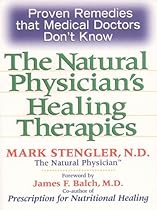 WHAT ARE THE SIDE EFFECTS?
St. john's wort has a good safety rating. However, one study reported that some people experienced digestive upset, fatigue, restlessness, and allergic reactions using St. john's wort extract.
A number of researchers have reported that St. john's wort may cause the skin to be sensitive to light. There have been a few reports of people's skin burning more easily, or of their eyes becoming more sensitive to light. I don't think it is a side effect to be overly worried about. WHAT ARE THE SIDE EFFECTS?
St. john's wort has a good safety rating. However, one study reported that some people experienced digestive upset, fatigue, restlessness, and allergic reactions using St. john's wort extract.
A number of researchers have reported that St. john's wort may cause the skin to be sensitive to light. There have been a few reports of people's skin burning more easily, or of their eyes becoming more sensitive to light. I don't think it is a side effect to be overly worried about. |
Bryan Hanson, PhD
See book keywords and concepts |
 John's wort, which is recommended for the treatment of mild depression. Some of
/
Hypericum perforatum. (Source: Woodville, William. Medical Botany containing systematic and general descriptions, with pl.s of all the medicinal plants, indigenous and exotic, comprehended in the catalogues of the material medica; as published by the Royal College of Physicians of London and Edinburgh; accompanied with a circumstantial detail of their medicinal effects, and of the diseases in which they have been most successfully employed. London: printed and sold for the author by J. Phillips, 1790, Vol. John's wort, which is recommended for the treatment of mild depression. Some of
/
Hypericum perforatum. (Source: Woodville, William. Medical Botany containing systematic and general descriptions, with pl.s of all the medicinal plants, indigenous and exotic, comprehended in the catalogues of the material medica; as published by the Royal College of Physicians of London and Edinburgh; accompanied with a circumstantial detail of their medicinal effects, and of the diseases in which they have been most successfully employed. London: printed and sold for the author by J. Phillips, 1790, Vol. |
Phyllis A. Balch, CNC
See book keywords and concepts |
 John's wort, white willow bark, and wintergreen have analgesic properties. White willow bark is also an anti-inflammatory.
Q Sage is good for its anti-inflammatory properties. Bring to a boil 2 tablespoons of dried, crushed sage leaves in 1 cup of water. Steep for twenty minutes and strain. Cool to a comfortable temperature and use the mixture to rinse your mouth several times daily.
Q Thyme is a natural antiseptic that reduces the level of bacteria in the mouth.
Recommendations
Q Eat plenty of raw fruits and vegetables. John's wort, white willow bark, and wintergreen have analgesic properties. White willow bark is also an anti-inflammatory.
Q Sage is good for its anti-inflammatory properties. Bring to a boil 2 tablespoons of dried, crushed sage leaves in 1 cup of water. Steep for twenty minutes and strain. Cool to a comfortable temperature and use the mixture to rinse your mouth several times daily.
Q Thyme is a natural antiseptic that reduces the level of bacteria in the mouth.
Recommendations
Q Eat plenty of raw fruits and vegetables. |
Thomson Healthcare, Inc.
See book keywords and concepts |
 BUCKTHORN
Antiarrhythmics
(Increased effect due to potassium loss with chronic use of herb) Cardiac Glycosides
(Increased effect due to potassium loss with chronic use of herb) Corticosteroids
(Increases hypokalemic effects) Digoxin
(Herb may cause hypokalemia, which may increase digoxin toxicity) Licorice Root
(Increases hypokalemic effects) Thiazide Diuretics
(Increases hypokalemic effects)
BUGLEWEED
Diagnostic Procedures Using
Radioactive Isotopes
(Herb interferes with these isotopes) Thyroid Preparations
(Effect not specified)
BUSPIRONE HYDROCHLORIDE
St. BUCKTHORN
Antiarrhythmics
(Increased effect due to potassium loss with chronic use of herb) Cardiac Glycosides
(Increased effect due to potassium loss with chronic use of herb) Corticosteroids
(Increases hypokalemic effects) Digoxin
(Herb may cause hypokalemia, which may increase digoxin toxicity) Licorice Root
(Increases hypokalemic effects) Thiazide Diuretics
(Increases hypokalemic effects)
BUGLEWEED
Diagnostic Procedures Using
Radioactive Isotopes
(Herb interferes with these isotopes) Thyroid Preparations
(Effect not specified)
BUSPIRONE HYDROCHLORIDE
St. |
Nicola Reavley
See book keywords and concepts |
 St john's wort (Hypericum perforatum)
St john's wort has a long history of use and has several actions including antidepressant, antiviral and antibacterial effects.
Uses
St john's wort is becoming increasingly popular as a treatment for mild to moderate depression, including menopausal depression. It can also be used to treat viral infections.
Cautions
High doses may cause photosensitivity and gastrointestinal upset. St john's wort (Hypericum perforatum)
St john's wort has a long history of use and has several actions including antidepressant, antiviral and antibacterial effects.
Uses
St john's wort is becoming increasingly popular as a treatment for mild to moderate depression, including menopausal depression. It can also be used to treat viral infections.
Cautions
High doses may cause photosensitivity and gastrointestinal upset. |
Bryan Hanson, PhD
See book keywords and concepts |
 John's wort was due to a molecule called hypericin, though now other molecules are under consideration (see Figure 1.1). My point is that even after identifying hypericin (or anything else) as an active ingredient, scientists will have many more questions, such as how to analyze a plant or a pill for its hypericin content.
So this book is about questions about medicinal plants, particularly questions about what's in them and how they work—in other words, understanding medicinal plants. It is intended for nonscientists, and I have tried to write for this audience. John's wort was due to a molecule called hypericin, though now other molecules are under consideration (see Figure 1.1). My point is that even after identifying hypericin (or anything else) as an active ingredient, scientists will have many more questions, such as how to analyze a plant or a pill for its hypericin content.
So this book is about questions about medicinal plants, particularly questions about what's in them and how they work—in other words, understanding medicinal plants. It is intended for nonscientists, and I have tried to write for this audience. |
Gary Null, Ph.D.
See book keywords and concepts |
 Ernst, [St. john's wort as Antidepressive Therapy], Fortschr Med, 113(25), September
10, 1995, p. 354-355.
This placebo-controlled, randomized, double-blind study examined the effects of a St. john's wort extract, Li 160, on patients suffering from moderateley severe depression. 66% of those receiving treatment responded positively versus only 26.7% of the controls.
—U. Schmidt & H. Sommer, [St. john's wort Extract in the Ambulatory Therapy of Depression: Attention and Reaction Ability are Preserved], Fortschr Med, 111(19), July 10, 1993, p. 339-342. Ernst, [St. john's wort as Antidepressive Therapy], Fortschr Med, 113(25), September
10, 1995, p. 354-355.
This placebo-controlled, randomized, double-blind study examined the effects of a St. john's wort extract, Li 160, on patients suffering from moderateley severe depression. 66% of those receiving treatment responded positively versus only 26.7% of the controls.
—U. Schmidt & H. Sommer, [St. john's wort Extract in the Ambulatory Therapy of Depression: Attention and Reaction Ability are Preserved], Fortschr Med, 111(19), July 10, 1993, p. 339-342. |
| This review article notes that recent studies have shown that St. john's wort is a clinically effective depression treatment equal to standard medication and without its negative side effects.
—E. Ernst, [St. john's wort as Antidepressive Therapy], Fortschr Med, 113(25), September
10, 1995, p. 354-355.
This placebo-controlled, randomized, double-blind study examined the effects of a St. john's wort extract, Li 160, on patients suffering from moderateley severe depression. 66% of those receiving treatment responded positively versus only 26.7% of the controls.
—U. Schmidt & H. Sommer, [St. |
James F. Balch, M.D. and Mark Stengler, N.D.
See book keywords and concepts |
 St. john's wort for depression—An overview and metaanalysis of randomized clinical trials. British Medical Journal 313:253-58.
Diabetes
Diabetes is a chronic health problem that involves elevated blood sugar levels. The metabolism of carbohydrates, proteins, and fats directly or indirectly leads to the production of the substance glucose, also known as blood sugar. Glucose is needed to supply energy to every cell in the body. If glucose levels become too elevated then they become toxic to the brain and other body organs. With diabetes, two main problems can occur. St. john's wort for depression—An overview and metaanalysis of randomized clinical trials. British Medical Journal 313:253-58.
Diabetes
Diabetes is a chronic health problem that involves elevated blood sugar levels. The metabolism of carbohydrates, proteins, and fats directly or indirectly leads to the production of the substance glucose, also known as blood sugar. Glucose is needed to supply energy to every cell in the body. If glucose levels become too elevated then they become toxic to the brain and other body organs. With diabetes, two main problems can occur. |
Heather Boon, BScPhm, PhD and Michael Smith, BPharm, MRPharmS, ND
See book keywords and concepts |
 Several studies suggest that it may have similar effects in patients with mild to moderate depression.
St. john's wort extracts have been compared directly with several tricyclic anti-depressants48 and found to be equally as effective as imipramine;44-53,58 maprotiline;40 or amitriptyline.59 However, these studies have been criticized due to the small numbers of patients and the low doses of conventional tricyclic anti-depressants to which the St. john's wort was compared.47
A systematic review of studies comparing St. Several studies suggest that it may have similar effects in patients with mild to moderate depression.
St. john's wort extracts have been compared directly with several tricyclic anti-depressants48 and found to be equally as effective as imipramine;44-53,58 maprotiline;40 or amitriptyline.59 However, these studies have been criticized due to the small numbers of patients and the low doses of conventional tricyclic anti-depressants to which the St. john's wort was compared.47
A systematic review of studies comparing St. |
The Life Extension Editorial Staff
See book keywords and concepts |
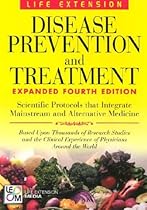 John's Wort, talk to your physician about safe ways to do this.
St. john's wort has been shown to diminish the effectiveness of a growing list of dmgs: digoxin, warfarin, phenprocoumon, cyclosporin, amitryptiline, theophylline, oral contraceptives, indinavir, and some anticancer dmgs. Primarily, it lowers the blood levels of these dmgs. How? Research suggests that active ingredients in the herb crank up the production of a liver enzyme called CYP3A, which breaks down a host of compounds, including many dmgs. In other words, St. John's Wort, talk to your physician about safe ways to do this.
St. john's wort has been shown to diminish the effectiveness of a growing list of dmgs: digoxin, warfarin, phenprocoumon, cyclosporin, amitryptiline, theophylline, oral contraceptives, indinavir, and some anticancer dmgs. Primarily, it lowers the blood levels of these dmgs. How? Research suggests that active ingredients in the herb crank up the production of a liver enzyme called CYP3A, which breaks down a host of compounds, including many dmgs. In other words, St. |
David Heber, M.D., Ph.D.
See book keywords and concepts |
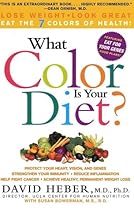 John's Wort
St. john's wort has had a reputation since antiquity of being able to offer protection from evil spirits, but in recent times it has been shown to be effective against common garden-variety depression, which is rampant in our society. Since the 1700s herbalists have been using St. john's wort for this purpose, but its medicinal use for wound healing, as a diuretic, and for nerve compression such as sciatica dates back to the time of Galen and Hippocrates in ancient Greece. There are over four hundred species of this plant distributed worldwide. John's Wort
St. john's wort has had a reputation since antiquity of being able to offer protection from evil spirits, but in recent times it has been shown to be effective against common garden-variety depression, which is rampant in our society. Since the 1700s herbalists have been using St. john's wort for this purpose, but its medicinal use for wound healing, as a diuretic, and for nerve compression such as sciatica dates back to the time of Galen and Hippocrates in ancient Greece. There are over four hundred species of this plant distributed worldwide. |
Walter Last
See book keywords and concepts |
 John's wort can be added while the herbs steep. St. john's wort is effective against depression.
The immune system can be strengthened with echinacea, propolis, European mistletoe (Viscum album), Easter lily, and reishi and other Asian mushrooms. Echinacea can be added to all other herb combinations. However, there are some research findings that echinacea can cause problems if taken uninterruptedly for several months, so it may be advisable to interrupt its use after a month and then to take it again a few weeks later. John's wort can be added while the herbs steep. St. john's wort is effective against depression.
The immune system can be strengthened with echinacea, propolis, European mistletoe (Viscum album), Easter lily, and reishi and other Asian mushrooms. Echinacea can be added to all other herb combinations. However, there are some research findings that echinacea can cause problems if taken uninterruptedly for several months, so it may be advisable to interrupt its use after a month and then to take it again a few weeks later. |












